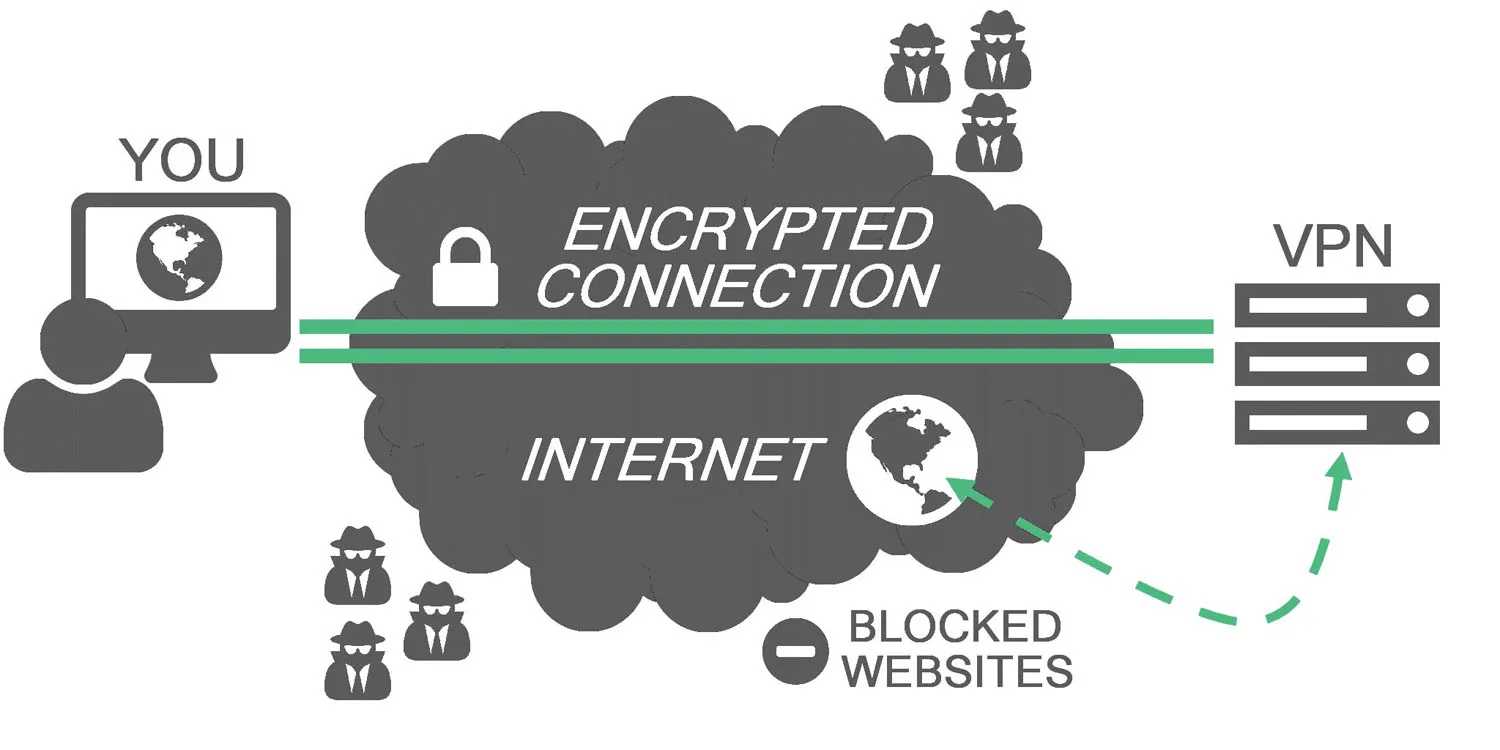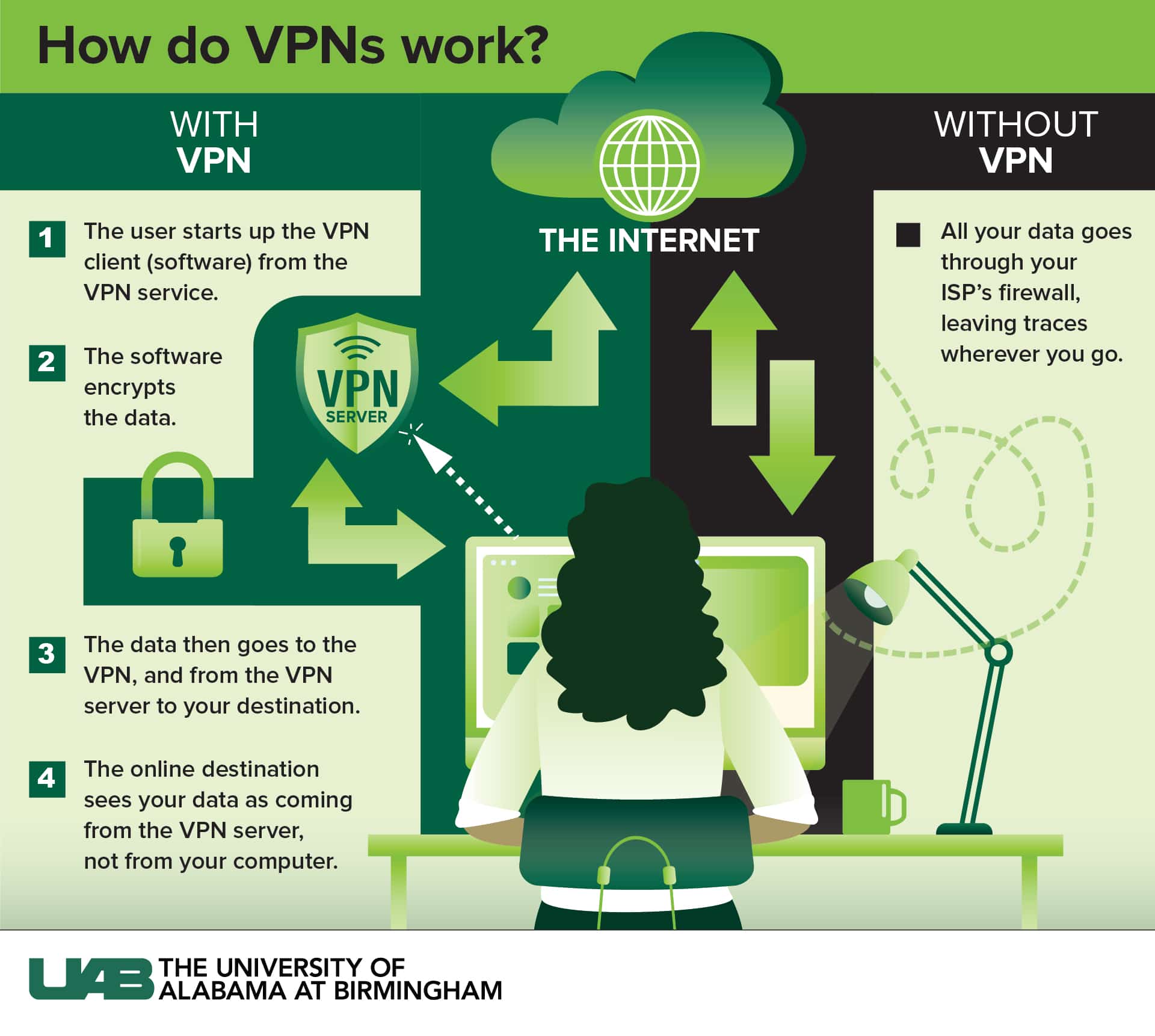The need for a Virtual Private Network cannot be overstated in today’s rapidly expanding digital world, where online threats and surveillance are on the rise. VPN services have become essential tools for both individuals and organizations, providing a strong defense against the ever-present dangers that lurk on the Internet.
The fundamental goal of a VPN is to provide users with a layer of anonymity that makes it extremely difficult for anyone, be they cybercriminals or nosy organizations, to trace your online actions back to you. In addition, VPNs encrypt your internet connection, keeping important data exchanged over the internet safe from potential hackers. This encryption ensures that even if your connection is intercepted, the data is scrambled and unintelligible to unauthorized parties.
Also read: How to Avoid Phishing Scams and Protect Yourself Online
However, choosing the right service from the vast number of alternatives on the market can be tricky. A rigorous review of several criteria, including speed, server locations, encryption techniques, logging rules, and ease of use, should be used to make the selection. You should also consider whether the VPN service meets your specific needs, such as streaming, torrenting, or bypassing geo-restrictions.
Determine Your Needs
Before venturing into the VPN market, it’s important to understand your individual needs. Asking yourself the following questions is an important first step in making an informed decision:
Why do you need such a service? Select your primary motivation. Is it anonymity, unblocking geo-restricted material, or improving your online security and privacy? Each of these goals may lead you to different VPN providers that specialize in different areas.
What devices will you use the VPN on? Consider the number of devices you want to secure or use with the VPN. Compatibility is important whether you’re using a Windows PC, Mac, Android smartphone, iOS tablet, or even a network. Check if your VPN provider has applications or settings for your specific devices.
Do you want a general-purpose VPN or one with more advanced features? Consider your usage habits. A basic VPN may be enough if you only want to use it for casual browsing, general security, or to view region-locked content. But if you enjoy torrenting or online gaming, you’ll need a VPN with strong performance and specialized features.
What else
How many simultaneous connections do you need? Some VPN companies allow multiple devices to connect to the same account at the same time, while others impose restrictions. Determine how many devices you need to cover to ensure all of your devices are protected.
Are you willing to pay for a premium VPN service or do you prefer a free alternative? While free VPNs are available, they often have limitations such as slower speeds, data limits, and potential privacy issues. Consider your budget and the importance you place on privacy and security. A premium VPN service often offers more features and reliability.
Understanding your individual needs and preferences will allow you to successfully narrow down your choices. With this clarity, you can begin the process of choosing a VPN that meets your goals and provides the level of online security, privacy, and functionality you require. Remember, making an informed decision based on your needs will result in a more enjoyable experience.
Check the Logging Policy
When looking for a VPN service for online protection and privacy, logging policy is an important issue to consider. A reliable VPN should have a strict no-logging policy, meaning that it does not record any information about your online activities. Here’s why this policy is important and how to spot it:
- Privacy: A no-logs policy is designed to protect your privacy. It ensures that the VPN service does not log your Internet traffic, browsing history, IP addresses, or any other information that can be used to identify you or your online activities. If this information is logged, it can be accessed by third parties such as government officials or hackers.
- Anonymity: When you use a no-logs VPN, your internet activities remain private and untraceable. This anonymity is crucial for users who want to protect their identity, especially in areas where censorship or surveillance is strict.
- Reliability: A VPN company that explicitly commits to a no-logs policy demonstrates its commitment to consumer privacy. It shows that the provider is not interested in harvesting and selling your information, as is the case with less trustworthy VPN providers.
How to Identify a No-Logs VPN:
Check the privacy statement: Start by carefully reviewing the VPN provider’s privacy policy. Look for clear language stating that they will not track your online activity, connection timestamps, IP addresses, or any other personally identifiable information.
Independent audits: Some services have their logging policies and security methods audited by third parties. To back up their no-logging promises, look for a VPN provider that has been audited by a reputable third party.
Transparency: Trustworthy VPN companies are open about their data practices. They should provide clear and straightforward information about what data they collect, if any, and how long it is kept.
User reviews and recommendations: Check out user reviews and recommendations from reputable sites to learn more about the VPN provider’s actual logging procedures and any past problems with user data.
Evaluate Security Features
When reviewing a VPN provider’s security features, make sure they offer strong protections to keep your online activities safe and private. Here are the most important security features to look for:
- Strong encryption:
The VPN should use advanced encryption protocols such as OpenVPN, IKEv2/IPsec, or WireGuard. These protocols use strong encryption to secure data transfer, making it almost impossible for unauthorized parties to intercept or decrypt your messages.
- The kill switch:
A kill switch is an important security feature. It ensures that if your VPN connection suddenly fails, your Internet access is immediately cut off. This stops your data flowing over an insecure network, protecting your privacy even during VPN outages.
- DNS Leak Defence:
Domain Name System (DNS) leak prevention is required to ensure that your DNS queries do not bypass the VPN tunnel. Without this protection, your ISP or other organizations may be able to track your online activities by intercepting DNS requests. A solid service should effectively prevent these breaches.
- MFA (Multi-Factor Authentication):
Multi-factor authentication increases the security of your VPN account. It is common practice to require not only a login and password, but also a second authentication mechanism, such as a one-time code from a mobile app or a hardware token. MFA strengthens the security of your account, making it much harder for unauthorized users to gain access.
- Split tunneling:
Split tunneling is a feature that allows you to choose which traffic flows over the VPN and which traffic goes directly to the Internet. This gives you more control over your network routing and can be beneficial in certain scenarios, such as routing only work-related traffic over the VPN while keeping other traffic local.
More features
In addition to these features, you should assess the VPN provider’s security reputation, its history of dealing with security issues (if any), and whether it has completed independent security audits. Reputable VPN companies focus on user security and regularly update their services to address emerging risks.
By carefully evaluating these security features and the provider’s overall commitment to customer privacy and security, you can choose a VPN that provides the powerful protection you need to access the Internet safely and securely.
Server Locations and Speed
Consider the geographical spread of the VPN provider’s servers. The more server locations they offer, the more likely you are to be able to access geo-restricted material. A larger server network can also improve connection speeds. If you plan to use the VPN for streaming or gaming, speed is critical.
Customer Support and Reputation
In this industry, reputation matters. To measure the user experience, look for consumer reviews and feedback. A reliable VPN service provider should have a responsive customer support team available 24 hours a day, 7 days a week to address any questions or concerns you may have.
Cost and Free VPNs
While free services are available, they sometimes have limitations such as slower speeds, data limits, and potentially questionable privacy policies. Premium VPN services usually offer better performance and security but often require a monthly membership fee. Consider your budget and how important your online privacy is to you.
Trial Periods and Money-Back Guarantees
Many VPN services offer free trials or money-back guarantees. Use these offers to try out the VPN and see if it meets your needs. This will ensure that you are not locked into a long-term contract if you are unhappy with the service.
Conclusion
Choosing the best service for your privacy and security requires careful analysis of your needs, as well as the policies, security features, and reputation of the provider. By following the steps outlined in this article, you can make an informed decision and enjoy a more secure and private online experience. While VPNs are an excellent tool for protecting your privacy, they should be used in conjunction with other security measures for optimal effectiveness.



